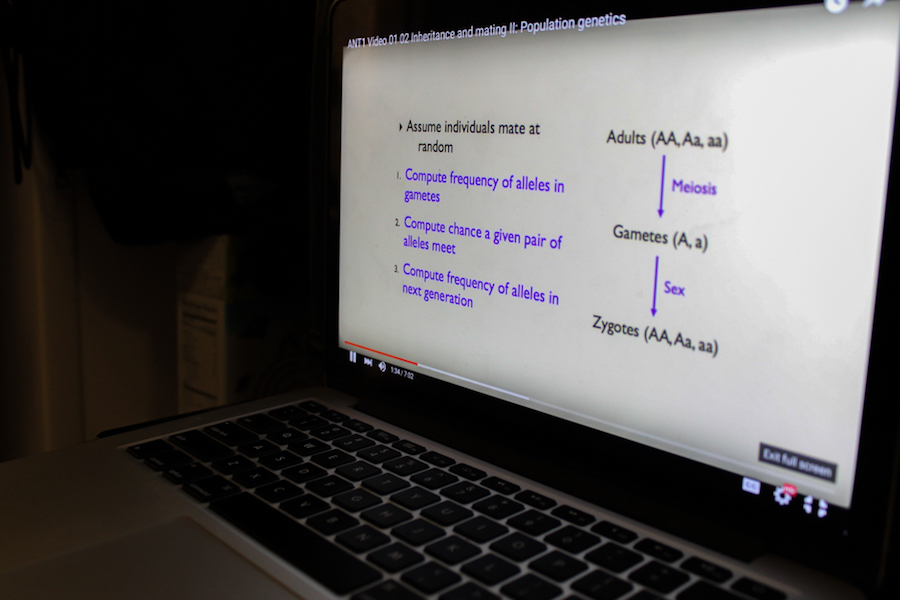
Hybrid, online courses impact students, campus life
In an era of smart cars, smart phones and smart homes, the world has become increasingly accessible with the click of a button. As the world becomes more efficient, the education system is unsurprisingly seeking to accommodate more students and different learning styles in innovative ways.
Universities such as UC Davis are finding new ways of using technological advancements to enhance students’ education, including incorporating online and hybrid courses into numerous undergraduate departments. Carolyn Thomas, the vice provost and dean for Undergraduate Education, has played a significant role in incorporating such courses at UC Davis.
“I think online and hybrid courses, if done well, will enable students to be more flexible in the ways they’ve learned to learn,” Thomas said in an email interview. “I also think more online courses, especially in the summer, will help students complete their degrees within four years.”
Online courses at UC Davis are taught through video lectures and often supplemented with discussion boards, homework and quizzes. Apart from exams that require a proctor to supervise the students, the rest of the work is completed online. Hybrid courses offer a portion of a class online but also have a designated time during the week for students to meet with their respective professors or teaching assistants. Hybrid courses often allow for smaller class size so that students can ask questions and further discuss course material.
The flexible structure of these hybrid and online courses allows students to manage their time in a way that will be most productive for them. These types of courses can free up time during the week for students to participate in other activities they may not have been able to do otherwise. Noy Shaked, a fourth-year managerial economics major, found that taking a hybrid course allowed her to more effectively manage her time.
“For example, on Fridays I have an online lecture [and] I don’t have to watch [it] exactly at the time it’s assigned,” Shaked said. “I’m actually able to go to my internship meeting at that time [instead]. So I think that it just allows for more opportunities and flexibility.”
Students can pause, rewind and rewatch video lectures as many times as needed — a benefit unique to the medium. Meanwhile, in-person office hours and hybrid class periods still give students a chance to ask instructors questions about the lecture so that not all face-to-face communication is lost.
With these options, UC Davis has created a flexible environment for students without disrupting the campus atmosphere. Hybrid and online courses foster opportunities for students to learn online at home and bring their questions to their professors either in class or during office hours.
“I think more online and hybrid courses might also enable us to have more students working closely with faculty in learning environments that are truly high impact,” Thomas said. “We would be able to use our human resources more wisely […in] discussion classes, seminars and in mentored internship or research experiences.”
Chi-Yuan Tsai, a teaching assistant for ECN 115BY — Hybrid Economic Development — found that students were able to ask more in-depth questions during his class after watching the lectures at home, making better use of class time.
“I think it’s more effective,” Tsai said. “If they already watch[ed] the video online then they can understand [or] find out their problem and then come to class and ask questions.”
Often, students move away from home and attend college not only for educational purposes but also for the social aspects of the “college experience.” According to John Theobald, a continuing lecturer in the Department of Communication, online and hybrid courses may not require as much on campus and in-person interaction, which can detract from the sense of community on campus.
“I think it depends on how much instruction comes from the online courses,” Theobald said. “I benefited greatly from being on campus. The interactions I had with other people […] were the most memorable influential parts of the whole experience. As long as that persists, I think the students will be benefited positively from online and hybrid instruction.”
Hybrid courses allow for smaller classroom sizes, allowing for increased flexibility. This creates space for more students to ask questions and for professors to cater lectures to the students’ needs.
“I would like our students to have a number of options when it comes to how and where they would like to learn,” Thomas said. “Classroom teaching, when students are engaged and in dialogue with their instructor, is wonderful and this is what we will always want the majority of our classes to be because there is no substitute for this kind of transformational learning. At the same time, online courses can be a very effective way to learn material, especially material that students need time to absorb or interact with in complex ways.”
The idea behind hybrid and online courses is not to transition entirely to online learning, but rather to enhance students’ educational experiences at UC Davis by broadening the way in which classes are taught. Online and hybrid courses offered at UC Davis are curated to supplement students’ education and maintain the unique experience UC Davis has to offer.
“[This structure] will give students an opportunity […] to do a lot more with their time,” Shaked said.
Written by: Elizabeth Marin – features@theaggie.org



